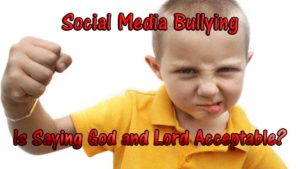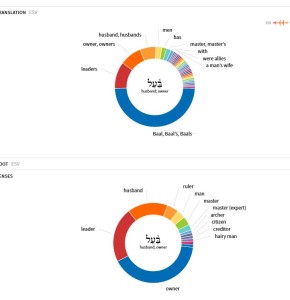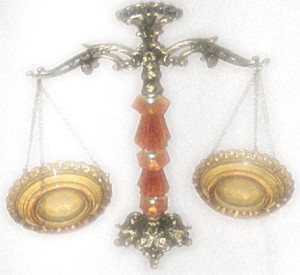Social Media Bullying: Is Saying God and Lord Acceptable?
 You’re quite fortunate if you run in social media circles within the Hebrew Roots/Messianic movement or other denominations of Christianity and haven’t had a run-in with people who are quick to tell you why this or that is pagan, sinful, or just plain wrong. One of the most popular areas in which newcomers are attacked is in the usage of the honorific titles of Lord and God, which are used as English language equivalents to the Hebrew words, Adonai and Elohim. And I am not referring to people who simply prefer to pronounce the Tetragrammaton, I am talking about the people who go out bent on conquering, making it a salvation issue.
You’re quite fortunate if you run in social media circles within the Hebrew Roots/Messianic movement or other denominations of Christianity and haven’t had a run-in with people who are quick to tell you why this or that is pagan, sinful, or just plain wrong. One of the most popular areas in which newcomers are attacked is in the usage of the honorific titles of Lord and God, which are used as English language equivalents to the Hebrew words, Adonai and Elohim. And I am not referring to people who simply prefer to pronounce the Tetragrammaton, I am talking about the people who go out bent on conquering, making it a salvation issue.
Now, it’s one thing when seasoned veterans get bombarded with this stuff – but the folks preaching this, often very unkindly and with threats of damnation, do not pay the slightest bit of attention to whether someone has been a believer one hour, or fifty years, or whether they are thirteen years old, or eighty years old. Truly, one of the great evils of social media religious preaching is that we do not have a relationship with the people we are approaching, and therefore have no idea if we even should approach them. We lack the wisdom to know if we are instructing them or confusing them, or even damaging them. I don’t want this to happen to anyone’s kid and so after years of pondering this, I am finally setting it down in writing.
So, let’s look at the use of honorifics in the Bible – and we will use a specific example from my own social media wall a couple of weeks ago. I was talking about it being the anniversary of coming to an understanding of Torah being for today, and I praised “Adonai.” This was the response I got from someone who I had never heard from before:
“Well, I guess you are still waiting for Him to ask you what His proper name is! His name is not Adonai or Lord or God but…”
FYI, I removed His Name from the quote because the sarcastic and ignorant nature of the comment brought His Name to shame. I literally felt embarrassed for my King. Of course, I know the Name, the four-letter Tetragrammaton – it was silly, arrogant, and undiscerning to presume otherwise, just because I chose to use a formal title that means “My Lord” or “My Master.”
Before I start, I want to give a little bit of an example of how the usage of intimate Names compares with the usage of honorifics when addressing someone with whom we are not social equals:
Your Majesty,
I applaud your Highness on your recent speech to parliament. It was a privilege to hear the wisdom of your Grace addressing the legislature. Long live the Queen!
Okay, that letter was respectful, right? Let’s try it again without the honorifics, but still speaking with nothing but kindness:
Elizabeth Windsor,
I applaud you, Elizabeth, on your recent speech to Parliament. Liz, it was a privilege to hear your wisdom as you addressed the Legislature. I hope you live forever.
Notice that I said nothing uncomplimentary in either letter. But the tone was different – in the first, I was speaking to someone socially way above me and in the second I was either speaking as a peer, a buddy, or a cheeky little monkey. Probably her Majesty would see my impertinence as a qualification for the latter lol. The point is, did I dishonor her in any way by referring to her with honorifics instead of her actual name? Certainly not, if anything, I elevated her – and that is exactly what happens when an honorific title is used instead of the Tetragrammaton or its short form Yah.
So, is there cause to rebuke anyone for using a respectful title? What do we see in the Scriptures? In the Hebrew, and the Greek, do we see the use of titles or only the use of the Name? (I will note here that I have no beef with anyone who pronounces the Name – we see it used all throughout Scripture as well – just not exclusively).
Let’s look specifically at Adonai – first used by Abraham in Genesis 15:2 directly to God, and God doesn’t get the slightest bit offended and say, “Why aren’t you calling me by my Name? Do you want the pagans to think you are talking about someone else?” Nope – why would God take offense to a man submitting himself as a servant? It was a fitting and appropriate thing to do. The prophets thought so too–as Adonai is used 434 times to describe God as Lord and Master.
How about El/Elohim? El is a word that is the Hebrew equivalent of the English God (which came from the Germanic Gott, and is not to be confused with the pagan deity Gad or the Tribe of Gad in the Bible – there is no link between Semitic and Germanic languages – we can’t rightly say that the languages were divided at Babel and also say that they are still all related) and shows up within the monikers El Elyon (Most High God) nineteen times in the Psalms, El Olam (Everlasting God) and the more commonly known El Shaddai (commonly rendered Almighty God) throughout Genesis. Elohim is a generic word meaning mighty one or god, and refers to both the God of Abraham, Isaac, and Jacob and various false gods, angels, civic leaders, judges, etc.
Elohim itself is used over 2600 times in the Hebrew Scriptures and has a lot of different meanings–one of which is a title of the Supreme God. Although I could go into more detail on this, suffice it to say that it is used exclusively for God in Genesis 1-4.
One of the really interesting aspects of the charge that it is a sin to use titles or that it is somehow disrespectful, besides the fact that just about every Biblical figure of note uses them when speaking of/to God, is that we also have the testimony of Yeshua/Jesus and the Apostles, none of which ever utter the Tetragrammaton – even though there was one in Greek that we have archaeological evidence of. In English, the first-century Greek version of the Tetragrammaton would be rendered Iawe (ee-ah-way), and here is a link to another blog post with the information on that.
So are we to accuse Yeshua of sinning, or of not knowing the Name, or of being disrespectful, or any one of these accusations we see commonly flying around? May it never be! Not only did Yeshua never sin, but He always did the will of His Father. If He said the Name, it would be recorded for us. What we do see is Theos, Kyrios, and Pater – the Greek equivalents of God, Lord/Master, and Father. Abba (Aramaic for Father) is used only once by Yeshua (Mark 14:36) and twice by Paul (Romans 8:15 and Galatians 4:6).
The case for using only a pronunciation of the Tetragrammaton YHVH, yod-hey-vav-hey, or the short form Yah is therefore without merit and would require one to ignore both the Hebrew and Greek canonical text, as well as the Septuagint (LXX), Dead Sea Scrolls, Pseudepigraphic writings, as well as all other Jewish writings through the Millenia. This is really a non-doctrine if someone is trying to enforce it – it has to be strong-armed because it has no Scriptural merit excepting for an out of context reading of verses which promote the proclaiming of the Name – which is problematic to read exclusively as referring to a personal name because the word shem (name) also means reputation/renown. In the ancient Near Eastern world, everything was about honor/reputation/renown – in fact, we still equate a man’s “good name” as being equal to his reputation, not a collection of expressed syllables.
So should we be concerned about the Name of God? Absolutely – and I am talking about His reputation here. Speaking syllables is easy, anyone can do it according to their theory of how it was pronounced – but if we speak those syllables with our bad character backing it up, we are dragging that name through the manure we are wallowing in. No, we must take care that our character is superlative, that we go from glory to glory, becoming more and more like Yeshua, the express image of God and our example in all things.
Be sure to check out the related posts about the words Lord, Christ, Yahweh, IHS, and Amen.


